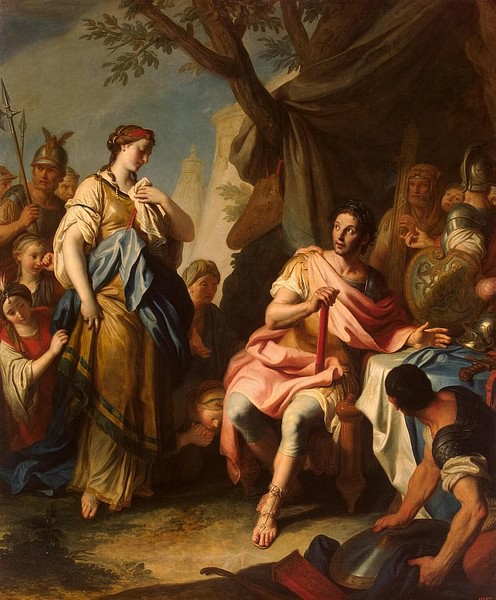
After Alexander the Great's victory over King Darius III at the Battle of Gaugamela in 331 BCE, he had to contend with small rebellions that broke out across his empire. In the summer of 328 BCE, one such rebellion occurred in the eastern satrapy of Bactria, a rebellion that would lead to a chance meeting with the beautiful Roxanne.
When Bactria rebelled, Alexander and his army quickly marched to suppress it. Thirty thousand Bactrians had taken refuge in a citadel situated high above a sheer cliff, called the Rock of Sogdiana. Alexander sent a message to Arimazes, the commander of the fortress, calling for him to surrender. The reluctant Arimazes replied asking if Alexander could fly because he would need “winged soldiers” to defeat him. The proud Alexander was not about to let the nearly impossible stop him. He asked for the best cliff-climbers among his army, promising a reward for the first man to reach the top of the cliff: Three hundred men volunteered. By morning, while only losing thirty men, they reached the top — surrender immediately followed. It was here, according to the one historian, that Alexander first saw among the captives the lovely Roxanne and immediately fell in love.
Another version of the story, related by the historian Plutarch, has Oxyartes, the satrap of Bactria, hold a banquet immediately after the surrender in Alexander's honor. One of the dancers that night caught Alexander's eye. It was the sixteen-year-old daughter of Oxyartes: Roxanne, a name that means “little star.” She was considered by many of those who saw her as the most beautiful woman they had ever seen — even more beautiful than the wife of the fallen King Darius. According to Plutarch, while she may have been the only woman Alexander ever loved, there was another possible reason for the marriage. He wrote:
As for his marriage with Roxana, whose youthfulness and beauty had charmed him at a drinking entertainment, where he first happened to see her taking part in a dance, it was indeed a love affair, yet it seemed at the same time to be conducive to the object he had in hand. For it gratified the conquered people to see him choose a wife from among themselves
Because Alexander and his army were called to battle elsewhere, a marriage between Alexander and Roxanne would have to wait. Eventually, however, Oxyartes and the new Persian king broke bread together, a Macedonian custom. The marriage between Roxanne and Alexander which finally took place in 327 BCE has continued to be a point of contention among historians. Was it a marriage of love or a political alliance as Plutarch suggested? Such marriages were something Alexander's father had done on a number of occasions. It is also unlikely that Alexander would have taken advantage of Roxanne without marriage, another violation of his policies. It follows, therefore, that the marriage was in line with Alexander's policy of uniting the two cultures — Greek and Persian. Alexander would later insist that many of his commanders take Persian wives (something that would lead to bitter feelings after his death).
Little is known of Roxanne following her marriage until Alexander's death in 323 BC. While some historians indicate she may have travelled with him into India and was at his side in Babylon, the one thing that is agreed upon by all is that she was pregnant at the time of his death. Her next appearance was in Macedonia where she awaited the birth of her son, the future Alexander IV, along with her mother-in-law Olympias. While she waited, the fate of the empire waited with her.
Alone among Alexander's generals, Perdiccas wanted to wait until the baby's birth to decide the future of the empire. For selfish reasons, Perdiccas had hoped to keep the empire together, for he would then be able to serve as regent for the young king. The other generals — Ptolemy I, Antigonus I, and Seleucus I Nicator— did not want to wait but demanded the empire be divided among them. This argument would eventually lead to what historians call the Successor Wars. Roxanne, with the support of Olympias, was hoping the empire would remain intact for the yet unborn Alexander. There were, however, other possible claimants, including Alexander the Great's half-brother, Phillip Arrhidacus, a child of Phillip and Philinna of Larissa, but since he was thought to be “dim-witted,” the young Arrhidacus was not considered too powerful of a threat.
Were there other claimants? Roxanne seems to have wanted to be sure her son was the only one and sent for Alexander's “other” wife Statira. According to Plutarch,
Roxana, who was now with child, and upon that account much honoured by the Macedonians, being jealous of Statira, sent for her by a counterfeit letter, as if Alexander had been still alive, and when she had her in her power, killed her and her sister, and threw their bodies into a well, which they filled with earth…
Jealously and indecision caught up with Roxanne. Wanting to maintain his own small portion of the empire, Cassander, son of Antipater and heir to Macedonia, had Roxanne and the thirteen-year-old Alexander IV killed in 310 BCE. With the death of his son, Alexander's lineage died as well.







